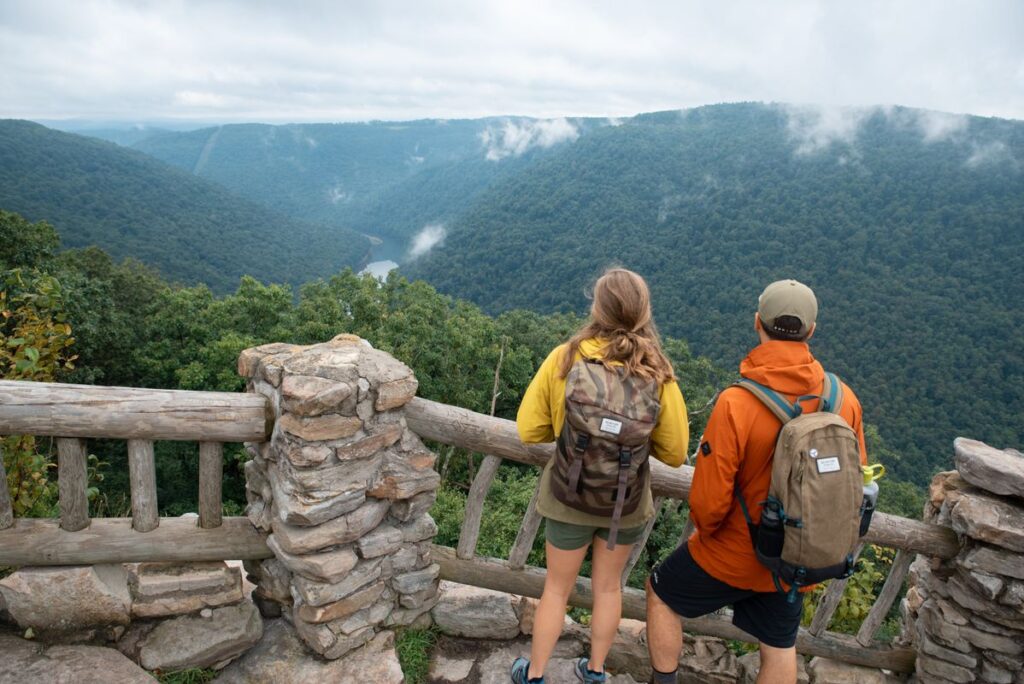Growing up in a small town in West Virginia, Jessica Willis dreamed about living in a big city. She graduated from college and did just that: For five years, she reveled in all that Pittsburgh has to offer while teaching school in the borough of Wilkinsburg.
But even as she enjoyed her job and her adopted city, Willis often spoke to colleagues about West Virginia’s beautiful landscape. She missed the mountains and the chance to be near family. But she had already uprooted her life once. Was it possible to start all over again?
The answer came when Willis discovered a program called Teachers Ascend Into West Virginia.
“They described it as a program that brought teachers to West Virginia and also really revolved around nature and being in the outdoors,” she says. “It was right up my alley.”
Willis is now one of nine people teaching in Monongalia and Preston counties as part of the inaugural cohort of Teachers Ascend. With help from a Moonshot Grant from Remake Learning, this innovative program was designed to help to battle the state’s teacher shortage while also offering career advancement and a quality-of-life boost to hardworking teachers.
HOW THIS INNOVATIVE PROGRAM WAS BORN
“The teacher shortage is not a new problem and it’s a problem that everyone is trying to solve,” says Erika Klose, director of adult education and teacher preparation for the West Virginia Department of Education (WVDE).
Several years ago, while discussing this seemingly intractable problem with a group of educators, Klose found herself musing out loud: A program called Ascend West Virginia had success bringing new workers to the state by connecting them with outdoor recreation and offering them funding toward relocation and monthly expenses. What if something similar could be created for teachers?
The educators sitting at that meeting table with Klose were intrigued by the idea, says Donna Peduto, who now runs the program in her role as executive director of the West Virginia Public Education Collaborative.
“Erika came up with this idea, and my board of directors loved it, and the superintendent of schools loved it,” Peduto says.
The challenge, though, was that Ascend West Virginia is a program for remote workers who arrive in the state with their own jobs. How might the concept be adjusted to help teachers find in-person jobs in West Virginia? There was a powerful spark of an idea here, but it was unexplored and untested.
Fortunately, that’s exactly the kind of idea that is funded by Moonshot Grants.
“We needed to do research and find out what would bring teachers to West Virginia,” Peduto says. “We could not have done it without the grant, because it gave us a year to plan it.”
Peduto and her team interviewed people at organizations like Teach for America and also worked closely with WVDE to design the program. That sense of collaboration was incredibly valuable, she says.
“The Teacher Prep department at WVDE could have viewed it as competition, because they do a lot of great recruitment,” Peduto says. “But they helped us every step of the way.”
The team also did nationwide surveys, which showed that teachers will relocate “to places that have a beautiful environment, lots of outdoor recreation and tight-knit communities,” she says. “That’s important to teachers nationwide.”
Along with spending time outdoors, potential teachers wanted three incentives:
- tuition assistance to further the teacher’s education
- a stipend that would help with relocation and living expenses
- and the chance to be involved in the community, with opportunities to volunteer and spend time together as a cohort
Each of these elements became part of Teachers Ascend and they helped draw math teacher Drew Calandrelli to the program. Like Willis, he grew up in West Virginia but had moved away — in his case, to St. Louis.
Calandrelli had begun looking into moving home when he discovered Teachers Ascend. “While looking for jobs, I applied to the program,” he says, “Luckily, I found a job and was accepted into the program at the same time.”
Teachers Ascend helped Calandrelli’s family with moving costs, “which was a really big perk for us,” he says. “The financial incentive is great, and the areas that they’re recruiting to — a lot of them pay better than you’d actually think they would, too. So if you’re looking to move back, the Ascend program is just going to be icing on the cake.”
Beyond the financial perks, he says, the intangible benefits have been just as meaningful.
This fall, he and his wife took their 2-year-old son to Cooper’s Rock State Forest for a long walk through the woods, something they couldn’t have done if they had remained in St. Louis. “We didn’t make it very far, because he got distracted with sticks and everything,” Calandrelli says, “but it was really cool just to be able to take him outdoors.”
Along with exploring the outdoors with his wife and son, he has also appreciated the sense of community the program provides. Participants are matched with mentors (Calandrelli was paired with a fellow math teacher) who are already working in the community. And they are invited to events affiliated with the larger Ascend West Virginia program.
In September, fifth-grade teacher Nicole Radick joined a group bike ride for Teachers Ascend members, who can rent bikes for free. Since then, she rented a bike nearly every week until the weather got too cold.
“We went white water rafting at the end of September, too,” she says, “and that was really fun.”
Also a West Virginia native, Radick had been teaching in Richmond, Va., for 11 years. When she began thinking about moving home, a friend sent her an article about Teachers Ascend. She was excited to apply.
“It turns out that leaving and coming back was probably my best decision, because I feel like I have a renewed love for Morgantown and West Virginia,” Radick says. Her new district, “is a breath of fresh air. I loved my old district, too, don’t get me wrong. But sometimes you need change, and it’s been such a wonderful change. The kids and the staff are amazing.”
This is exactly the kind of success story that Peduto and Klose had in mind when they began collaborating to create Teachers Ascend.
“It’s just so exciting to see the power of an idea, and how an idea can really become something, especially when you have the right people that are able to do it,” Klose says. “The Public Education Collaborative works so well with the Department of Ed, and works so well with WVU, and works so well with our local county school districts.”
Peduto agrees: “That’s what it’s all about, always, right? The relationships.”
Authored by

Melissa Rayworth
Melissa Rayworth has spent two decades writing about the building blocks of modern life — how we design our homes, raise our children and care for elderly family members, how we interact with pop culture in our marketing-saturated society, and how our culture tackles (and avoids) issues of social justice and the environment.
